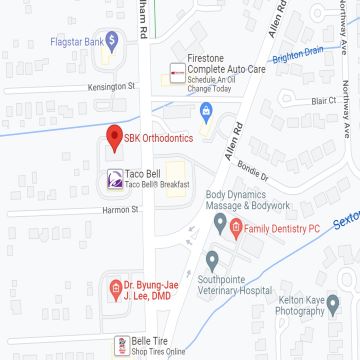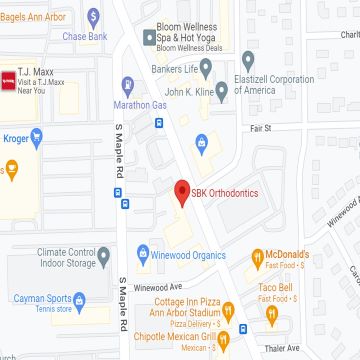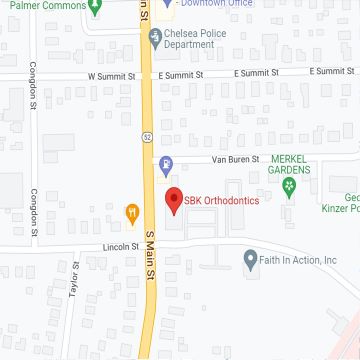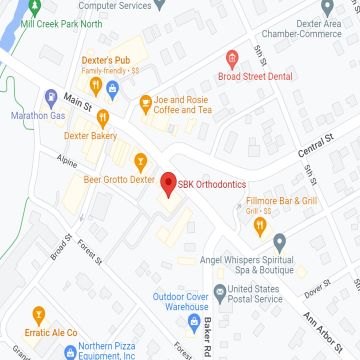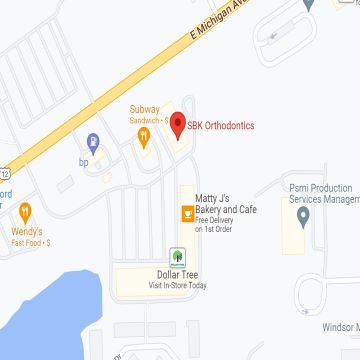
If you’re looking for the best orthodontic treatment in Ann Arbor, you’re in luck! Dr. Stieper, Dr. Brust, and Dr. Khatib want to make sure that their Ann Arbor patients get to achieve the best version of their smiles. We provide our patients with high-quality solutions that rely on cutting-edge technology, innovative software use, and the creation of a uniquely fun and friendly environment where you can let your smile shine!
What Is Corrective Jaw Surgery?
Corrective Jaw Surgery in Ann Arbor helps patients improve their bite and function, appearance, and speech impairments when orthodontics and non-invasive procedures are not enough. As a treatment option, this type of jaw surgery can positively impact your overall health and life.
The results of corrective jaw surgery are for life, and while you’ll still have to maintain good oral hygiene habits to ensure you don’t suffer from any additional problems, you will notice your quality of life improving a great deal once this treatment achieves its goals.
Do You Need Corrective Jaw Surgery?
There are plenty of things we can achieve with orthodontics as a non-invasive treatment option, but there are cases that will require corrective jaw surgery. Please contact our team about this treatment if you check any of the following:
- Experience considerable difficulty chewing, biting food, or swallowing.
- Feel chronic pain around your jaw.
- Suffer from constant headaches when you bite down on food.
- Notice excessive tooth wear.
- Consider you have an unbalanced facial appearance from the front or side (asymmetry).
- Suffered considerable face injury or trauma during your childhood.
- Were diagnosed with a receding chin or protruding jaw.
- Cannot close down your mouth and make your lips meet without straining your facial muscles.
- Notice chronic mouth breathing and dry mouth.
Some patients that require corrective jaw surgery don’t need so because of situations that happened as they were growing up; instead, plenty of them were born with a condition that makes their jaws grow at distinct rates.
Get Help From Your Ann Arbor Orthodontist
Our team can help you achieve the best version possible of your smile. Keep in mind that some patients who get corrective jaw surgery might also need a treatment plan that they can only get with the best orthodontist Ann Arbor has available.
Make sure you get in touch with our orthodontic office in Ann Arbor and set an appointment to learn more about the ways in which orthodontics and corrective jaw surgery can help you fix your smile and live a better life!
What to Expect With Corrective Jaw Surgery?
Ann Arbor Corrective jaw surgery, also known as orthognathic surgery, offers a comprehensive approach to addressing jaw-related issues. During the procedure, an oral and maxillofacial surgeon will reposition and realign the jawbones, correcting malocclusions and facial asymmetry. Patients can expect an initial evaluation to determine the suitability of the surgery, followed by careful pre-surgical planning and discussions. On the surgery day, anesthesia ensures comfort, and precise incisions and bone adjustments are made. Afterward, a recovery period of several months is typical.
What Are the Do’s and Don’ts After Jaw Surgery?
After jaw surgery, following post-operative guidelines is crucial for a successful recovery. Do’s include adhering to the prescribed soft food diet, taking pain medication as directed, and attending all follow-up appointments. Practice good oral hygiene but avoid vigorous rinsing. Use ice packs to reduce swelling and get plenty of rest. Don’ts include avoiding hard, chewy, or sticky foods, refraining from smoking, and not skipping medications. Avoid strenuous activities and do not touch or disturb the surgical site unnecessarily.
What Are the Cons of Corrective Jaw Surgery?
Ann Arbor Corrective jaw surgery, while beneficial for many, comes with potential drawbacks. Some cons include post-surgical swelling and discomfort, which can take time to subside. Recovery may be lengthy, impacting daily activities. Also, infection and other surgical risks are possible but rare. Some patients may experience changes in sensation or temporary numbness in the facial area. Additionally, like any surgery, there are anesthesia-related risks. It’s crucial for individuals to discuss with their surgeon to make an informed decision about their concerns.
How Long Does It Take To Recover From Corrective Jaw Surgery?
The recovery period from corrective jaw surgery varies depending on individual factors and the extent of the procedure. Generally, initial swelling and discomfort subside within a few weeks. Patients typically return to a soft food diet during this time. Over the next few months, as bones heal and facial tissues adjust, gradual improvements occur. Yet, full recovery can take several months, with most normal activities resuming within six weeks.
What Exactly Is Jaw Reconstruction?
Jaw reconstruction is a complex surgical procedure aimed at rebuilding or repairing the jawbone. It is often necessary for individuals who have experienced traumatic injuries, congenital defects, or extensive jaw-related issues. The process involves the use of bone grafts, implants, or other techniques to restore the jaw’s structural integrity and functionality. Additionally, oral and maxillofacial surgeons perform this procedure, carefully planning and executing the reconstruction to achieve the best possible results.




